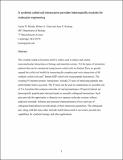A Synthetic Coiled-Coil Interactome Provides Heterospecific Modules for Molecular Engineering
Author(s)
Reinke, Aaron Wade; Grant, Robert A.
DownloadReinke_JACS_2010_acceptedversion.pdf (2.226Mb)
OPEN_ACCESS_POLICY
Open Access Policy
Creative Commons Attribution-Noncommercial-Share Alike
Terms of use
Metadata
Show full item recordAbstract
The versatile coiled-coil protein motif is widely used to induce and control macromolecular interactions in biology and materials science. Yet the types of interaction patterns that can be constructed using known coiled coils are limited. Here we greatly expand the coiled-coil toolkit by measuring the complete pairwise interactions of 48 synthetic coiled coils and 7 human bZIP coiled coils using peptide microarrays. The resulting 55-member protein “interactome” includes 27 pairs of interacting peptides that preferentially heteroassociate. The 27 pairs can be used in combinations to assemble sets of 3 to 6 proteins that compose networks of varying topologies. Of special interest are heterospecific peptide pairs that participate in mutually orthogonal interactions. Such pairs provide the opportunity to dimerize two separate molecular systems without undesired crosstalk. Solution and structural characterization of two such sets of orthogonal heterodimers provide details of their interaction geometries. The orthogonal pair, along with the many other network motifs discovered in our screen, provide new capabilities for synthetic biology and other applications.
Date issued
2010-04Department
Massachusetts Institute of Technology. Department of BiologyJournal
Journal of the American Chemical Society
Publisher
American Chemical Society
Citation
Reinke, Aaron W., Robert A. Grant and Amy E. Keating. "A Synthetic Coiled-Coil Interactome Provides Heterospecific Modules for Molecular Engineering." J. Am. Chem. Soc., 2010, 132 (17), pp 6025–6031.
Version: Author's final manuscript
ISSN
0002-7863
1520-5126